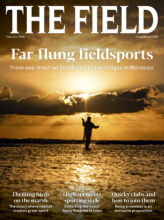To save British wildlife we need to understand and appreciate those who own and manage the land, says Teresa Dent, chief executive of the Game & Wildlife Conservation Trust.
A BETTER WAY FOR CONSERVATION?
So if we spend all this money and put in all this time, effort and expertise why the continuing tales of woe? Is there a way we could “reset” to do better? Do I have the answer? Of course not – there is no simple answer. But I believe there are answers out there and I am delighted to say that our research is fundamental to this.
On this beautiful but overcrowded island the conservation of wildlife is a human activity and needs to be actively done. Emma Marris put it well in her book Rambunctious Garden (2011): “We are… running the whole world whether we admit it or not. To run it consciously and effectively we must admit our role and even embrace it. We must temper our romantic notion of untrammelled wilderness and find room next to it for the more nuanced notion of a global, half-wild rambunctious garden, tended by us.”

The curlew was once abundant, but now no longer.
She is not the first to think this way. Aldo Leopold (1887-1948) was an American ecologist who lived, farmed and harvested game in Wisconsin. He was a founder of the science of wildlife management and used the lessons of game conservation to put forward a philosophy of conservation that became one of the foundations of modern conservation thinking. He stated, “There are those who shy at the prospect of a man-made game crop as something artificial and therefore repugnant. This attitude shows good taste but poor insight. Every head of wildlife still alive in this country is already artificialised, in that its existence is conditioned by economic forces. Game management merely proposes that their impact shall not remain merely fortuitous. The hope for the future lies not in curbing the influence of human occupancy – it is already too late for that – but in creating a better understanding of the extent of that influence and a new ethic for its governance.”
I was told a story by a large conservation organisation, about a nature reserve with two pairs of oystercatchers. They are long-lived birds and these four came back to breed every year – unsuccessfully because their nests were predated by crows. The adults survived so the population on the reserve remained constant. The organisation wrestled with the question as to whether it should control the crows. But the organisation was in favour of a natural system of wildlife and it is natural for crows to eat eggs. It was uncomfortable with lethal control of predators and nothing non-lethal could keep the crows from the eggs. There was a deep-rooted belief that wildlife would do better if there were less human interference, not more.





